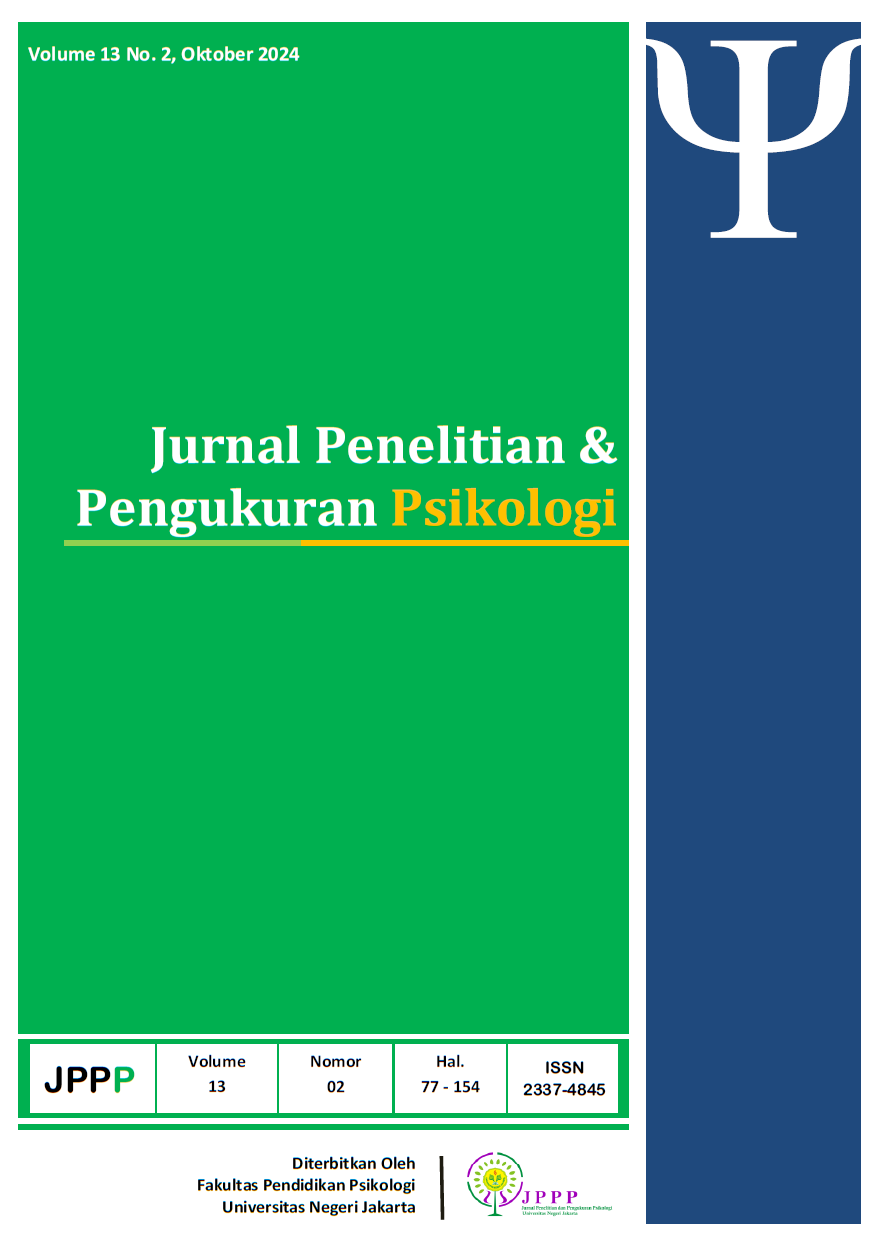Uji Validitas Konstruk Intsrumen Pengukuran School Climate dengan Metode Confirmatory Factor Analysis (CFA)
DOI:
https://doi.org/10.21009/JPPP.132.04Keywords:
confirmatory factor analysis, school climate, second-order modelAbstract
Penelitian ini bertujuan untuk menguji validitas konstruk dari instrumen iklim sekolah yang diadaptasi dari Fisher dkk. (2020) menggunakan metode Confirmatory Factor Analysis (CFA). Instrumen ini mengukur tiga dimensi iklim sekolah: keterhubungan sekolah (school connectedness), keamanan sekolah (school safety), dan hubungan antar teman (peer relationships). Data dikumpulkan dari 875 siswa Madrasah Aliyah Negeri (MAN) di Kota dan Kabupaten Tasikmalaya. Hasil analisis menunjukkan bahwa model second-order memiliki kecocokan yang baik (RMSEA = 0,049, CFI = 0,953, TLI = 0,941) dan semua item valid dengan muatan faktor yang signifikan (nilai-t > 1,96). Penelitian ini menegaskan bahwa instrumen yang diadaptasi adalah ukuran yang andal dan valid untuk mengukur school climate dalam konteks pendidikan di Indonesia khususnya Madrasah Aliyah.
References
Brown, T. A. (2006). Confirmatory factor analysis for applied research. Guilford Press.
Cohen, J., Mccabe, E. M., Michelli, N. M., & Pickeral, T. (2009). School climate: Research, policy, practice, and teacher education. Teachers College Record, 111(1), 180-213. https://doi.org/10.1177/016146810911100108
Demirtas-Zorbaz, Selen., Akin-Arikan, Cigdem., & Terzi, Ragip. (2021). Does school climate that includes students’ views deliver academic achievement? A multilevel meta-analysis. School Effectiveness and School Improvement, 32(4), 543-563. 10.1080/09243453.2021.1920432
Fisher, A., Fisher, S., Arsenault, C., Jacob, R., & Barnes-Najor, J. (2020). The moderating role of ethnic identity on the relationship between school climate and self-esteem for African American adolescents. School Psychology Review, 49(3), 291-305. https://doi.org/10.1080/2372966X.2020.1760690
Grazia, V., & Molinari, L. (2021). School climate research: Italian adaptation and validation of a multidimensional school climate questionnaire. Journal of Psychoeducational Assessment, 39(3), 286-300. https://doi.org/10.1177/0734282920967141
Hambleton, R. K., Merenda, P. F., & Spielberger, C. D. (Eds.). (2005). Adapting educational and psychological tests for cross-cultural assessment. Psychology Press. https://books.google.co.id/books?id=po15AgAAQBAJ
Hu, L.‐t., & Bentler, P. (1999). Cutoff criteria for fit indexes in covariance structure analysis: Conventional criteria versus new alternatives. Structural Equation Modeling: A Multidisciplinary Journal, 6(1), 1-55. https://doi.org/10.1080/10705519909540118
Rahmawati, S.W. (2016). Peran iklim sekolah terhadap perundungan. Jurnal Psikologi, 43(2), 167-180. 10.22146/jpsi.12480
Saputra, W. N. E., Supriyanto, A., Astuti, B., Ayriza, Y., & Adiputra, S. (2020). The effect of student perception of negative school climate on poor academic performance of students in Indonesia. International Journal of Learning, Teaching and Educational Research, 19(2), 279-291. 10.26803/ijlter.19.2.17
Thapa, A., & Cohen, J. (2013). A review of school climate research. Review of Educational Research, 83(3), 357-385. doi:10.3102/0034654313483907
Umar, J., & Yunita, F. N. (2020). Uji validitas konstruk dengan CFA dan pelaporannya. JP3I (Jurnal Pengukuran Psikologi dan Pendidikan Indonesia), 9(2), 1-11. 10.15408/jp3i.v9i2.16964
Wang, J., & Wang, X. (2020). Structural equation modeling. In Applications Using Mplus (Second Edition ed., pp. 20-23). Chennai: John Wiley & Sons Ltd.
Wong, Mitchell D., Dosanjh, Kulwant K., Jackson, Nicholas J., Rünger, Dennis, & Dudovitz, Rebecca N. (2021). The longitudinal relationship of school climate with adolescent social and emotional health BMC Public Health, 21(1), 1-8. 10.1186/s12889-021-10245-6







